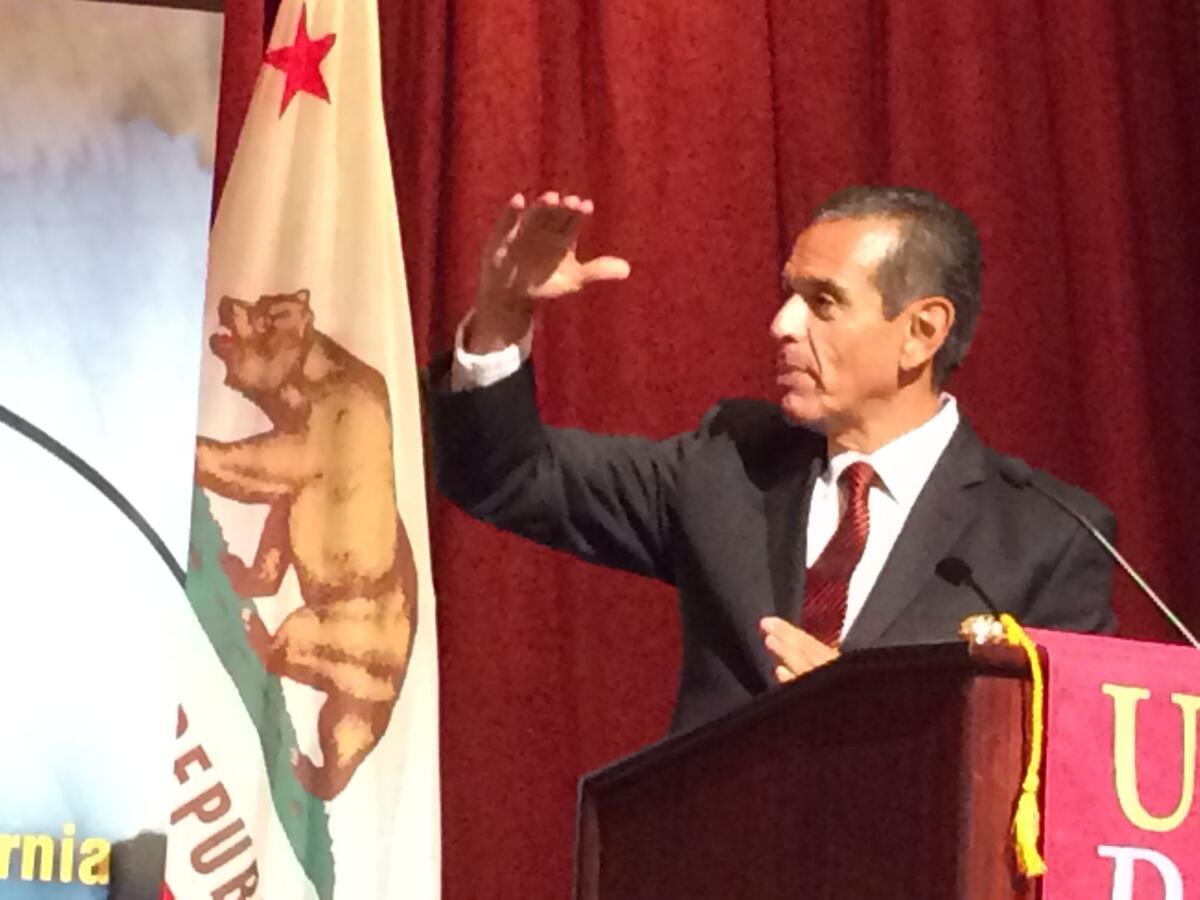Former L.A. Mayor Antonio Villaraigosa endorses charter expansion effort

Former L.A. Mayor Antonio Villaraigosa speaks during a forum on education at USC on Monday. In an interview, Villaraigosa endorsed a plan to more than double the number of charter schools in Los Angeles.
Former Los Angeles Mayor Antonio Villaraigosa has endorsed a controversial effort to more than double the number of the city’s charter schools over the next eight years.
Villaraigosa declared his support for the plan in an interview after an education forum he hosted Monday evening at the University of Southern California.
“I would support any effort to expand high-quality education,” Villaraigosa said. “So I could certainly support that, particularly if it’s spearheaded by the highest-performing charters.”
The draft of the proposal, which was developed by the locally based Eli and Edythe Broad Foundation, sets a goal of raising $490 million to open 260 charters, enrolling about 130,000 students.
Charter schools are independently operated and are exempt from some rules that govern traditional campuses. Most are non-union. The L.A. Unified School District already has more than 200 charters, the most of any school system in the country.
Supporters see a rapid expansion as a way to fundamentally and quickly improve the city’s education system, especially for black and Latino students from low-income families. Critics contend that an explosion of new charter schools would sap vital resources from L.A. Unified and leave behind students who are more difficult and more expensive to educate.
Villaraigosa said some of the critics have raised “legitimate questions.”
“Those who are proposing this are going to have to take into account some of those real issues,” he said.
“I don’t think just expanding charter is the path,” Villaraigosa said. “I said while I was mayor that I didn’t care if it was a charter school or a traditional public school or a hybrid … I want to see more success and higher standards and accountability.”
The primary backer of the expansion, Eli Broad, has been a key political ally of Villaraigosa and could be again if the former mayor, as expected, runs to succeed Jerry Brown as governor of California.
Villaraigosa still has a stake in the traditional school system as the political force behind the creation of the Partnership for Los Angeles Schools, which began during his eight years as mayor, 2005-13. The partnership manages 16 traditional public schools under a contract with L.A. Unified.
The group’s latest campus, 107th Street Elementary, was added this fall at the request of the district, which was dissatisfied with academic progress at the school.
Villaraigosa deferred comment on the progress of efforts to select a new superintendent for L.A. Unified. When asked if he’d be interested in the job, he replied, with a grin: “I’ve already been asked.”
But he declined to clarify whether he meant that he’d been asked that question before or whether he’d been asked if he would consider taking the job.
The Times’ new education initiative to inform parents, educators and students across California >>
The L.A. Board of Education recently launched a search for a new schools’ chief; Supt. Ramon C. Cortines has said he would like to leave by the end of the year.
Villaraigosa oversaw the Monday event in his role as a professor at the USC Price School of Public Policy. The topic was Creating a 21st Century Education System, and it focused on challenges facing all levels of education.
Moderated by Matt Miller, the former radio and print analyst, the panel included Julia Lopez, president of College Futures Foundation; Joshua Pechthalt, president of the California Federation of Teachers; Van Ton-Quinlivan, vice chancellor of California Community Colleges; and Marshall Tuck, a former candidate for state superintendent of public instruction who now serves as educator in residence for New Teacher Center.
Twitter: @howardblume
MORE ON L.A. CHARTER SCHOOLS:
Test scores complicate the debate over expanding L.A. charter schools
Plan to boost charters splits L.A. Unified board
$490-million plan would put half of LAUSD students in charter schools
More to Read
Sign up for Essential California
The most important California stories and recommendations in your inbox every morning.
You may occasionally receive promotional content from the Los Angeles Times.










